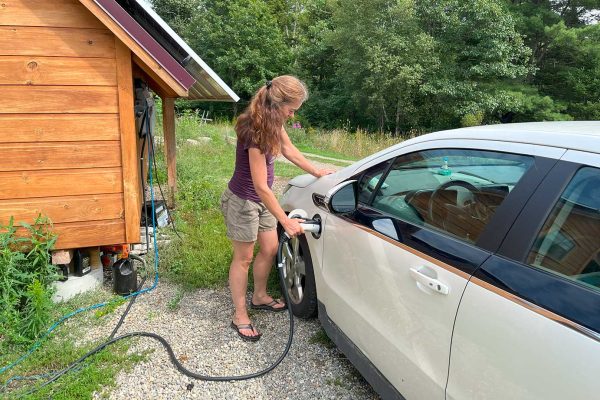The end of 2023 is fast approaching, and with it, the final opportunity for the Board of Environmental Protection (BEP) to vote in favor of clean cars standards that would get more Mainers into affordable electric vehicles and dramatically reduce air pollution and the greenhouse gas emissions that are causing climate change.
The Fifth National Climate Assessment released last month underlines what we know to be true: “future climate change impacts depend on choices made today.” Without rapid action to reduce emissions today, the risks of climate change grow exponentially. We are already experiencing the impacts of climate change here in Maine, with smoke from wildfires in our skies each summer, kids staying home from school due to high-heat days in the fall, and mud season extending in duration and intensity. Put simply, we have no time to lose.
Adopting the Advanced Clean Cars II (ACCII) and Advanced Clean Trucks (ACT) standards by the end of the year is Maine’s best opportunity to reduce emissions from our most-polluting sector and bring down the prices of electric cars and trucks. These common-sense standards, in tandem with investments in public transit and active transportation trails for biking and walking, are the key to getting all Mainers to jobs, schools, and services without damaging our climate.
During their October meeting, BEP members indicated in a preliminary vote that they intend to adopt ACCII, but disappointingly positioned themselves to delay adopting ACT. The Natural Resources Council of Maine (NRCM) worked with Maine people and businesses to advocate for these stronger standards so we can remain competitive. Many of the vehicles covered by ACT, like delivery vans, are available now, and the market is growing fast. Passing one but not the other would hold us back, especially when we know pollution from bigger trucks is having serious impacts on our health.
Unfortunately, opponents of these rules are spreading a lot of misinformation about electric vehicles (EV) and what these standards would do. As the BEP prepares to make its final decision, we wanted to set the record straight on some of the most common misconceptions we’re hearing.
Sales of Electric Cars and Trucks are Booming
 There has been a recent run of stories here in Maine and nationally that imply there is little demand for electric cars. The numbers tell a different story.
There has been a recent run of stories here in Maine and nationally that imply there is little demand for electric cars. The numbers tell a different story.
- The third quarter of 2023 showed the strongest year-on-year growth for EV sales in two years.
- EV sales rates have been growing steadily by 60% each quarter for the past 6 quarters, meaning EV sales are doubling every 14 months on average.¹
- More than a million EVs were sold in 2023, tripling total sales from 2020.²
That’s astronomical growth for any industry and makes clear that electric cars and trucks are here to stay.
Recent incentives in the Bipartisan Infrastructure Law and the Inflation Reduction Act have been accompanied by billions of dollars in private investment in EV manufacturing and development.
- Within a year of passing the Inflation Reduction Act in the summer of 2022, 62 new EV supply chain projects specifically have been announced in the United States alone, including assembly facilities, battery factories, and battery cell production, totaling $52.7 billion in new investments.³
- Major auto manufacturers including Ford, Volvo, General Motors, Mercedes-Benz, Mitsubishi, and Audi have announced that 100% of their light-duty vehicles will be zero-emission by 2035.4
The industry is moving in this direction, and Maine needs to keep pace.
Maine Needs Stronger Clean Car Standards to Remain Competitive
While EV sales are surging everywhere, the 12 states that adopted the first Advanced Clean Cars standards saw two-thirds of total zero-emission vehicle sales between 2011 and 2020.5 Manufacturers will prioritize those states that have these standards on the books, and not only will available zero-emission vehicle stock go to those states first, they will come in at a lower price point to ensure manufacturers meet compliance.
Just this year, Colorado, New Mexico, Maryland, Delaware, and New Jersey joined 7 other states that have already adopted ACCII, bringing the total to 12 states. If Maine does not act, available EVs will go to those states first, including nearby states like Massachusetts, New York, and Vermont. These standards are driving the zero-emission market forward, and Maine only misses out by staying on the sidelines.
Maine is Well Positioned to Adopt Stronger Clean Car Standards
Maine is well positioned to adopt both of these standards thanks to recent work by the Maine Department of Transportation and Efficiency Maine.
- Maine is now in the top 10 for public EV chargers per capita, with more chargers coming online thanks to more than $25 million secured for Maine’s Plan for Electric Vehicle Infrastructure Deployment (PEVID).
- Another $15 million for charging infrastructure is expected to be awarded shortly, providing every confidence that Maine can keep up with EV adoption under ACCII.
- NRCM’s 2022 survey of all EV owners in Maine found that 98% of current EV owners would recommend an electric vehicle to a friend. People that have them love them; now we have to make sure more people have access to them.
Electrifying Trucks is Needed Now for Cleaner Air
 We’ve seen a lot of skepticism around zero-emission medium- and heavy duty vehicles, but electrification of larger vehicles has been coming fast and furious. Half of medium- and heavy-duty vehicle uses are electrifiable today, like delivery trucks and vans, and those percentages will increase as we move toward implementation in model year 2027.6 In 2023, there are 854 zero-emission medium- and heavy-duty truck models on the market, with more coming in each year.7
We’ve seen a lot of skepticism around zero-emission medium- and heavy duty vehicles, but electrification of larger vehicles has been coming fast and furious. Half of medium- and heavy-duty vehicle uses are electrifiable today, like delivery trucks and vans, and those percentages will increase as we move toward implementation in model year 2027.6 In 2023, there are 854 zero-emission medium- and heavy-duty truck models on the market, with more coming in each year.7
The ACT standard is written with plenty of flexibilities to ensure that it works for Maine. Sales requirements ramp up slower than ACCII, and most of the compliance can be met with Class 2b-3 vehicles like large pickup trucks and transit vans, which are easily electrifiable and already at work here in Maine. Some of the heaviest-duty vehicles, like logging trucks, may not electrify for decades, but the design of this policy is to encourage cutting emissions where it makes the most sense now, cleaning our air and saving businesses money on charging and maintenance costs along the way.
Stronger Clean Car Standards are Part of Maine’s Comprehensive Climate Action Plan
Opponents like to pretend these standards were sprung on Maine by surprise, but the reality is we’ve been working toward them for years now because of the urgency of climate change. Much of this work has involved extensive input from a wide variety of voices, including the trucking industry. Let’s do a quick timeline review to see how we got here.
2019: Maine passes LD 1679 (often referred to as “the Climate Law”) setting mandatory greenhouse gas emissions reduction targets and establishing the Maine Climate Council.
2020: The Maine Climate Council releases Maine’s first ever Climate Action Plan, Maine Won’t Wait, to set a path forward toward achieving our climate goals. Transportation is identified as the state’s most polluting sector and goals were set to get 219,000 EVs on the road by 2030 and calling for the creation of an EV roadmap to get us there.
2021: Maine develops a Clean Transportation Roadmap outlining the steps that should be taken to decarbonize the transportation sector. ACCII and ACT are two of the top recommendations in the Roadmap. “[The] most important regulatory driver in the electrification of Maine’s light-duty vehicles in the next two decades will be through Advanced Clean Cars II (ACC II) standards.”
The BEP considers the ACT standard for the first time. The standard is tabled to get stakeholder input. A medium- and heavy-duty stakeholder group is assembled and meets throughout the year.
2022: BEP takes no action on clean cars or clean trucks, despite the Clean Transportation Roadmap calling to implement both before the end of 2022.
2023: NRCM submits petitions to the BEP from hundreds of Maine people across the state to initiate rulemaking on both ACCII and ACT standards, joined on the ACT petition by Sierra Club and the Conservation Law Foundation.
A public hearing on the standards in August draws more than 2,000 public comments.
The BEP meets in October after reviewing the public comments received, and in a nonfinal vote elects to move forward toward a final vote on ACCII, but not on ACT. The final vote to implement the standards will take place in late December.
We Need to Act Now
For the health of our climate and the health of Maine people, it is essential that ACCII is implemented this year and truck standards are revisited as quickly as possible. The clean car standard provide manufacturers with a three-year lead time, so if passed this year, it would apply to vehicle model year 2027. Waiting another year would push implementation back to model year 2028, and we cannot afford to wait if we hope to achieve our climate goals and avert the worst impacts of climate change.
We plan to be ringing in the New Year with the knowledge that Maine is on the right track in implementing its climate goals. No matter what, we will keep working to ensure that zero-emission vehicles are accessible and affordable for Maine people and businesses.
—Josh Caldwell, NRCM Climate & Clean Energy Outreach Coordinator
2 https://x.com/coreybcantor/status/1731774630275301377?s=46&t=fuStRGEgnY5yyzKkIV6lKQ
3 https://www.charged-the-book.com/na-ev-supply-chain-map
6 https://rmi.org/rmi-analysis-with-smart-policy-truck-electrification-is-within-reach/










Leave a Reply